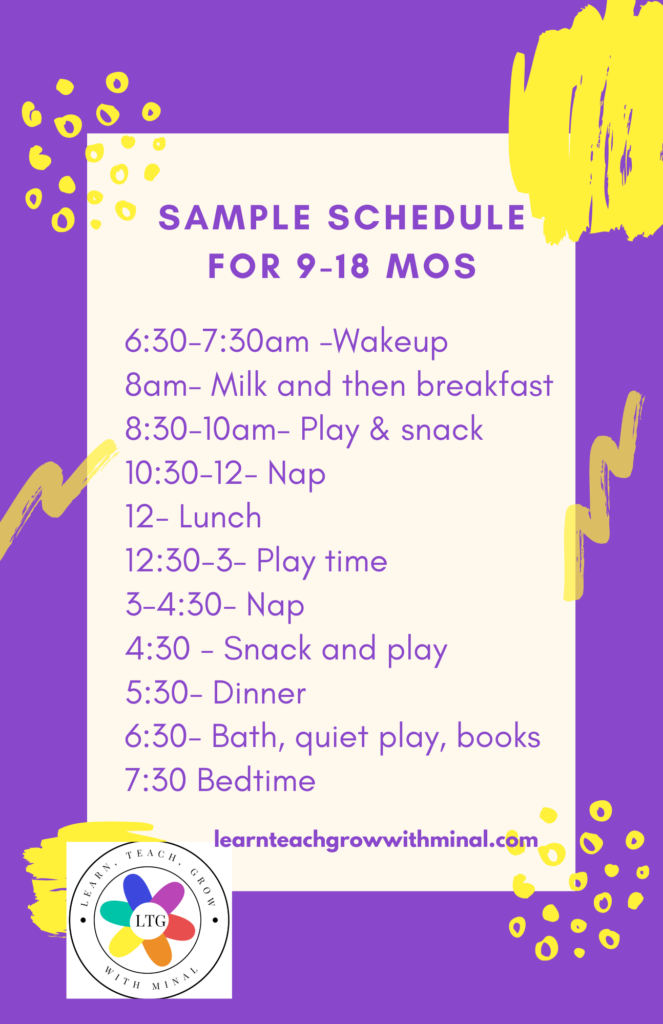How A Schedule Supports Social Emotional Growth

Question: Does it really matter if I have my child on a schedule?
Answer: YES!
I am often asked this question by my client’s families. My answer is always yes. It doesn’t matter if you are a stay at home mom, a work from home mom, have flexibility in your schedule, or don’t keep a schedule for yourself. I cannot express this loudly enough- Kids need schedules. In fact it is human nature to thrive on routines. When there is more predictability in the daily routines, the child is more relaxed and able to be more aware of their environment and curious to learn. Think about your own life, when you have a consistent routine you follow you feel more in control and you are able to handle challenges that come your way without becoming overwhelmed as easily. The same is true for babies and young children. Schedules help support babies social emotional development.
So many times in my experience I am working with a family because of a child’s difficulty with sleeping at nap or bedtime or a child that is cranky or perceived to have a lot of behavioral outbursts. In many of these instances, not all of course, once we get the child on a more consistent schedule, many of these issues start to get better. There is a lot of evidence and research out there on the importance of having a schedule for your child, please feel free to google it. Having routines helps create a sense of security and stability for young children. When children feel more secure in their home they are more open to change and are more flexible. They also have better and deeper sleep when kids follow the natural circadian rhythms of their body- this means that they wake up relatively close to when the sun comes up and go to bed close to when the sun goes down. That is actually how all of our bodies work the best. We actually have natural rhythms of sleep, hunger, and other bodily functions that are habitual. In fact the job of the brain is to try to make all functions of the body as habitual as possible so it can work most efficiently- which is why you find yourself snacking at times when you don’t even really want to eat!
In many of these instances, not all of course, once we get the child on a more consistent schedule, many of these issues start to get better. There is a lot of evidence and research out there on the importance of having a schedule for your child, please feel free to google it. Having routines helps create a sense of security and stability for young children. When children feel more secure in their home they are more open to change and are more flexible. They also have better and deeper sleep when kids follow the natural circadian rhythms of their body- this means that they wake up relatively close to when the sun comes up and go to bed close to when the sun goes down. That is actually how all of our bodies work the best. We actually have natural rhythms of sleep, hunger, and other bodily functions that are habitual. In fact the job of the brain is to try to make all functions of the body as habitual as possible so it can work most efficiently- which is why you find yourself snacking at times when you don’t even really want to eat!
 Let me clarify what I mean by schedule. I am not suggesting that you have to run your household in military fashion. What I am saying is that keeping bedtime, nap time, and meals within the same time frame- varying only by 15-20 minutes daily will help your child tremendously and it will transform your life. Trust me!
Let me clarify what I mean by schedule. I am not suggesting that you have to run your household in military fashion. What I am saying is that keeping bedtime, nap time, and meals within the same time frame- varying only by 15-20 minutes daily will help your child tremendously and it will transform your life. Trust me!
Imagine being able to know what time bedtime and nap times are so you can arrange to have time for your priorities- such as getting some chores/ work done, enjoy quiet time with your significant other, read a book, or watch a show for example. When you know when these things are happening you will have less stress and more control of your day. This can also be very helpful if you are a work from home mom or you would like to plan outings. It is incredibly challenging when you don’t know when your child will be sleeping or hungry. When these two basic primitive needs are met, your child will feel more content and comfortable which means that they can cope with disappointment and frustration better. By keeping a schedule, you will also be able to understand your child better, because you can simply look at time to help you rule out why they are having a tantrum. Are they hungry, sleepy, or ready for action?
Some of you may be concerned that by keeping a schedule your child may become too rigid and you picture yourself chasing the clock if you want to go visit with family members or friends in the evening on weekends. I have had so many people say, “I don’t want to be that person that has to leave early because it is my child’s bedtime/ nap time. I completely understand where you are coming from. What I would like you to understand is that while you are training your child to get into this new routine, you will want to keep things as relatively consistent as possible for a couple of weeks- so schedule outings for when the child is in their waking window. After a few weeks of consistency if once in a week you are altering the evening schedule it won’t throw them off if all the other days are consistent. You also may just end up with the kid that falls asleep anywhere!
Here is a typical schedule I recommend for 9- 24 month old children, but keep in mind that many kids are transitioning from the 2 naps a day to one longer nap schedule during this time also. Babies under 9 months have a different schedule since they typically take more than 2 naps a day. 
Download this sample schedule for free!
This is just a guideline- if your child wakes at 8 adjust accordingly. You can typically expect children by 12 months to be up for about 3-4 hours before needing a nap again. If your child is taking only one nap a day, then you can expect them to stay up until lunchtime and then nap from 12:30/1 pm to 3-4ish. I used a similar schedule for when my kids were young and I can attest it really helped everyone- they were happier and so was I because I could still have time in the evening to take care of my other priorities, which helped me feel less stressed during the day.
Here are some helpful insights:
- Start with a schedule as early as possible, babies can be on schedules from about 2-4 months of age in terms of their sleeping and eating schedule.
- Keep the schedule as close to the times that you have set as possible, without making yourself crazy.
- Listen to the natural rhythms of your baby
- Expect that there will be shifts in the schedule when time changes occur and when they are having growth spurts.
- Keeping your child active and engaged during play time will help to create better nap time routines
- It is not unusual for kids to wake up at the same time everyday even if they went to bed later the night before once they are on a consistent schedule
I hope you choose to institute a schedule and I would love to hear your feedback on what changes you may have witnessed in your child as a result! Can’t wait to hear from you! 


You May Also Like

Helpful Tips Before You Start Potty Training!
June 12, 2021
Social Emotional Growth in the First Year
February 17, 2023